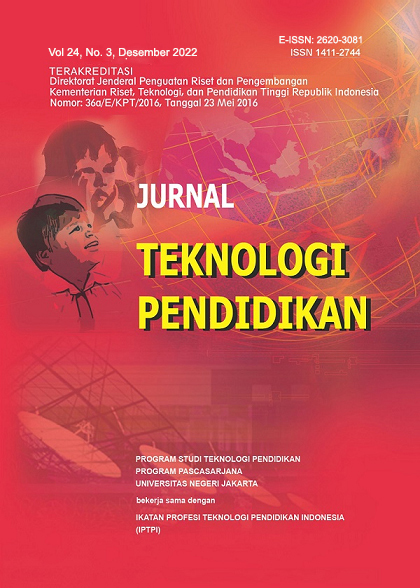Assessing Learning Management System (LMS) for The Dairy Farmer: Obstacles to Delivering Online Learning Content
DOI:
https://doi.org/10.21009/jtp.v24i3.31453Keywords:
Online Learning, Learning Management System, Online Learning ContentAbstract
Online learning is currently an alternative learning strategy for continuous learning amidst the limitations of face-to-face learning due to the spread of the Covid-19 outbreak. However, the implementation of online learning certainly does not only provide solutions but also provides obstacles in its implementation which results in the non-delivery of learning content in online learning. Of course this can have an impact on dairy farmers as new users of the Learning Management System. This study aims to analyze the constraints of online learning based on the responses that have been shared by Twitter social media users towards the implementation of online learning and to assess the use of LMS for dairy farmers. This study uses the Twitter data crawling method on Twitter social media user responses to the topic of online learning constraints and data visualization to analyze LMS usage by . The research findings state that most users of online learning complain about internet quota constraints and the technical constraints experienced by them resulting in learning content not being absorbed optimally. This research can enrich research related to the use of social media data as data that can be analyzed and documented for learning development.
References
Abuhammad, S. (2020). Barriers to distance learning during the COVID-19 outbreak: A qualitative review from parents’ perspective. Heliyon, 6(11). https://doi.org/10.1016/j.heliyon.2020.e05482
Alismail, H. A., & McGuire, P. (2015). 21st century standards and curriculum: Current research and practice. Journal of Education and Practice, 6(6), 150–154.
Anderson, T. (2008). The theory and practice of online learning. Athabasca University Press.
Baticulon, R. E., Sy, J. J., Alberto, N. R. I., Baron, M. B. C., Mabulay, R. E. C., Rizada, L. G. T., Tiu, C. J. S., Clarion, C. A., & Reyes, J. C. B. (2021). Barriers to Online Learning in the Time of COVID-19: A National Survey of Medical Students in the Philippines. Medical Science Educator, 31(2). https://doi.org/10.1007/s40670-021-01231-z
Bissoondoyal-Bheenick, E., Do, H., Hu, X., & Zhong, A. (2021). Learning from SARS: Return and volatility connectedness in COVID-19. Finance Research Letters, 41, 101796.
Bolliger, D. U., & Martin, F. (2018). Instructor and student perceptions of online student engagement strategies. Distance Education, 39(4), 568–583.
Dhawan, S. (2020). Online Learning: A Panacea in the Time of COVID-19 Crisis. Journal of Educational Technology Systems, 49(1). https://doi.org/10.1177/0047239520934018
Forson, I. K., & Vuopala, E. (2019). Online learning readiness: perspective of students enrolled in distance education in Ghana. The Online Journal of Distance Education and E-Learning, 7(4).
Ince, J., Rojas, F., & Davis, C. A. (2017). The social media response to Black Lives Matter: how Twitter users interact with Black Lives Matter through hashtag use. Ethnic and Racial Studies, 40(11). https://doi.org/10.1080/01419870.2017.1334931
Kumar, P., Saxena, C., & Baber, H. (2021). Learner-content interaction in e-learning- the moderating role of perceived harm of COVID-19 in assessing the satisfaction of learners. Smart Learning Environments, 8(1). https://doi.org/10.1186/s40561-021-00149-8
Kumar, S. (2015). 5 Common Problems Faced By Students In eLearning And How To Overcome Them. ELearning Industry. https://elearningindustry.com/5-common-problems-faced-by-students-in-elearning-overcome
Kurniawan, C., & Zakaria, Z. (2021). Pengembangan Pengukuran Kesiapan Pembelajaran Online dengan Pendekatan Data Demografis. Jurnal Pendidikan Edutama, 8(2).
Li, M. (2022). Learning Behaviors and Cognitive Participation in Online-Offline Hybrid Learning Environment. Journal of Emerging Technologies in Learning, 17(1). https://doi.org/10.3991/ijet.v17i01.28715
Luo, T., Shah, S. J., & Crompton, H. (2019). Using Twitter to support reflective learning in an asynchronous online course. 35(3).
Magen-Nagar, N., & Shonfeld, M. (2018). The impact of an online collaborative learning program on students’ attitude towards technology. Interactive Learning Environments, 26(5). https://doi.org/10.1080/10494820.2017.1376336
Oyedotun, T. D. (2020). Sudden change of pedagogy in education driven by COVID-19: Perspectives and evaluation from a developing country. Research in Globalization, 2(June). https://doi.org/10.1016/j.resglo.2020.100029
Richmond, A. S., & Conrad, L. (2012). Do Thinking styles predict academic performance of online learning? … Journal of Technology in Teaching \& Learning. https://sicet.org/main/wp-content/uploads/2016/11/ijttl-12-02-3_Aaron.pdf
Shahzad, A., Hassan, R., Aremu, A. Y., Hussain, A., & Lodhi, R. N. (2020). Effects of COVID-19 in E-learning on higher education institution students: the group comparison between male and female. Quality and Quantity. https://doi.org/10.1007/s11135-020-01028-z
Shahzad, A., Hassan, R., Aremu, A. Y., Hussain, A., & Lodhi, R. N. (2021). Effects of COVID-19 in E-learning on higher education institution students: the group comparison between male and female. Quality & Quantity, 55(3), 805–826.
Wei, H. C., Peng, H., & Chou, C. (2015). Can more interactivity improve learning achievement in an online course? Effects of college students’ perception and actual use of a course-management system on their learning achievement. Computers and Education, 83. https://doi.org/10.1016/j.compedu.2014.12.013
Downloads
Published
How to Cite
Issue
Section
License
Jurnal Teknologi Pendidikan is an Open Access Journal. The authors who publish the manuscript in Jurnal Teknologi Pendidikan agree to the following terms.
Attribution-ShareAlike 4.0 International (CC BY-SA 4.0)
-
Attribution — You must give appropriate credit, provide a link to the license, and indicate if changes were made. You may do so in any reasonable manner, but not in any way that suggests the licensor endorses you or your use.
-
ShareAlike — If you remix, transform, or build upon the material, you must distribute your contributions under the same license as the original.
- No additional restrictions — You may not apply legal terms or technological measures that legally restrict others from doing anything the license permits.
Notices:
- You do not have to comply with the license for elements of the material in the public domain or where your use is permitted by an applicable exception or limitation.
- No warranties are given. The license may not give you all of the permissions necessary for your intended use. For example, other rights such as publicity, privacy, or moral rights may limit how you use the material.








